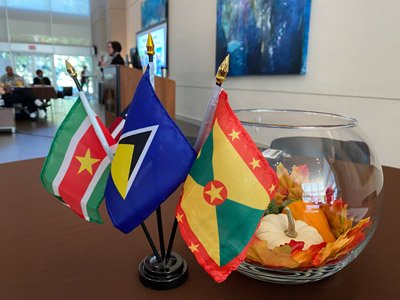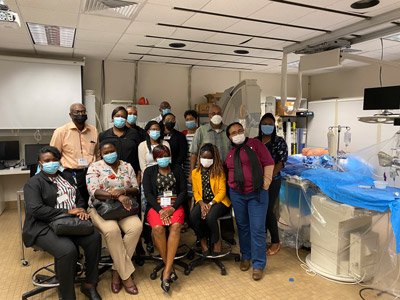Caribbean
Overview
Santa Fe College hosted a delegation of higher education officials from Grenada, St. Lucia and Suriname from October 25 to November 5, 2022. This program was part of the U.S. Department of State's Caribbean 2020 Strategy. The program was supposed to take place in the Fall of 2020, but the COVID-19 pandemic delayed its implementation. The Caribbean is a strategically important partner for the United States. The region can be seen as our third border, and it is the country's sixth largest trading partner. Immigration and international travel has also allowed Florida, in particular, to maintain close personal and professional ties to the people of this region.
 The three countries that were selected to participate in this CCAP share some common
characteristics. St. Lucia and Grenada are two of the smallest islands in the world.
St. Lucia is a 617 km2 and has a population of approximately 183,000 people. An overwhelming majority of
its residents (68%) are Afro-Caribbean. Approximately 3% of its population is Indo-Caribbean,
and 17% are mixed race. Grenada is a smaller island country with only 348.5 km2 and a population of 112,416. Visitors can rent a car and tour the island of Grenada
in about three hours, and St. Lucia can be traversed in less than one hour. Like St.
Lucia, most (82%) of Grenada’s population is Afro-Caribbean and approximately 13%
are mixed race. Suriname is the largest and most populous of the three countries.
It occupies 163,821 km2 on the South American continent and has a population of 586,682. Most of these individuals
live in or near the capital of Paramaribo. Suriname has a diverse milieu of residents:
37% of its population is East Indian, 15% are Javanese, and 31% are mixed race Afro-Dutch
descendants. A mere 3% of its population is Ameri-Indian. Suriname is one of the least
densely populated countries in the world with approximately four people per square
kilometer.
The three countries that were selected to participate in this CCAP share some common
characteristics. St. Lucia and Grenada are two of the smallest islands in the world.
St. Lucia is a 617 km2 and has a population of approximately 183,000 people. An overwhelming majority of
its residents (68%) are Afro-Caribbean. Approximately 3% of its population is Indo-Caribbean,
and 17% are mixed race. Grenada is a smaller island country with only 348.5 km2 and a population of 112,416. Visitors can rent a car and tour the island of Grenada
in about three hours, and St. Lucia can be traversed in less than one hour. Like St.
Lucia, most (82%) of Grenada’s population is Afro-Caribbean and approximately 13%
are mixed race. Suriname is the largest and most populous of the three countries.
It occupies 163,821 km2 on the South American continent and has a population of 586,682. Most of these individuals
live in or near the capital of Paramaribo. Suriname has a diverse milieu of residents:
37% of its population is East Indian, 15% are Javanese, and 31% are mixed race Afro-Dutch
descendants. A mere 3% of its population is Ameri-Indian. Suriname is one of the least
densely populated countries in the world with approximately four people per square
kilometer.
 Grenada, St. Lucia, and Suriname form part of the Caribbean Community (CARICOM). Part
of CARICOM’s approach to foster trade and development has focused on ensuring an educated
workforce in the region. During the last quarter of the twentieth century, Caribbean
governments focused on expanding access to primary and secondary education. CARICOM
developed the first regional TVET strategy in 1999. In 2003, the Caribbean Association
of National Training Agencies (CANTA) was established to ensure the development of
uniform competency-based training, assessment, and certification in the region. In
2013, a new, eight-tier system of Caribbean Qualifications Standards (CQS) was created
that more clearly matched with different levels of academic degrees and certificates
students can complete through formal schooling.
Grenada, St. Lucia, and Suriname form part of the Caribbean Community (CARICOM). Part
of CARICOM’s approach to foster trade and development has focused on ensuring an educated
workforce in the region. During the last quarter of the twentieth century, Caribbean
governments focused on expanding access to primary and secondary education. CARICOM
developed the first regional TVET strategy in 1999. In 2003, the Caribbean Association
of National Training Agencies (CANTA) was established to ensure the development of
uniform competency-based training, assessment, and certification in the region. In
2013, a new, eight-tier system of Caribbean Qualifications Standards (CQS) was created
that more clearly matched with different levels of academic degrees and certificates
students can complete through formal schooling.
Grenada and St. Lucia each has one community college. Sir Arthur Lewis Community College was established in 1985 and named after of St. Lucia’s Nobel Laureate in economics. The community college enrolls approximately 2000 students in various associate degree programs and a select few new baccalaureate programs. T.A. Marryshow Community College is the only public institution of higher education in Grenada. It was established in 1988 and enrolls approximately 2000 students in over 40 areas of study. Both institutions were founded inspired by the U.S. community college model. They train most of the skilled workforce on these islands and provide a critical springboard to university-level education. Suriname has a more diversified higher education system with various types of institutions helping to train the skilled workforce needed in the country. The CCAP allowed American community college administrators, staff and students to engage in an extended dialogue with peers from the Caribbean in order to better understand each other's educational system and highlight best practices.
Podcast
We invite you to listen to the podcast below featuring three South African CCAP participants:
- Gennesta Charles, Coordinator for Standards and Planning, Grenada National Training Agency
- Robby Glen Holband, Director of the Polytechnic College in Suriname
- Celeste Regis, Quality Assurance Officer, Sir Arthur Lewis Community College.
To view the transcript for any of our podcasts, please visit our media host's website